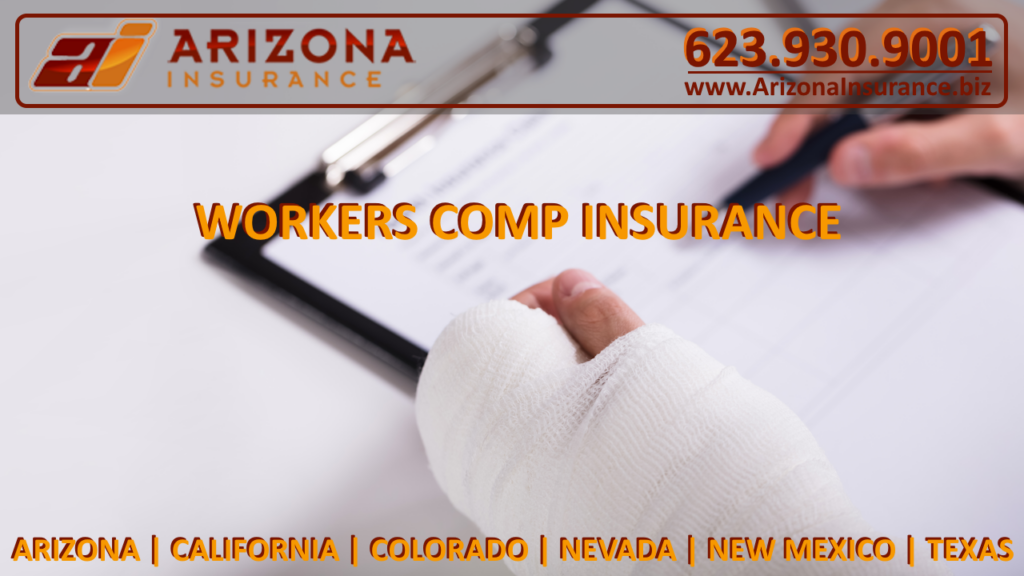Workers Comp Insurance | Workers Compensation Insurance For Business in the States of Arizona, Nevada, Colorado, California, New Mexico, and Texas
Workers Compensation is one of the most difficult to understand but necessary coverage for any business owner with employees.
Finding an insurance agency that understands, in depth, the true nature of how this insurance coverage works and can produce a quality quote fast is an employer’s biggest hurdle. At Arizona Insurance we are trained work comp professionals who are dedicated to improve all aspects of our clients’ workers compensation policy.
We provide loss analysis, classification review, experience modifier review, and other work comp specific techniques to assist in reducing and controlling premium cost year after year. In addition to what Arizona Insurance offers, we are supported by some of the strongest and most knowledgeable workers compensation carriers in the industry and like Arizona Insurance, their focus is on worker compensation insurance. We are direct, honest, and deliver the straight facts about workers compensation premiums.
Give Arizona Insurance the opportunity to improve your workers compensation experience in the states of Arizona, Nevada, Colorado, California, New Mexico, and Texas.


Serving Business Owners in Arizona, Nevada, Colorado, California, New Mexico, and Texas Since 2007
Workers Compensation Insurance Questions? Contact Arizona Insurance at (623) 930-9001 or Send an Email
Commercial Business Insurance

Commercial Business Insurance & Commercial Trucking & Transportation Insurance
In addition to Worker’s Compensation Insurance in Arizona, Nevada, Colorado, California, New Mexico, and Texas. Arizona Insurance also provides General Business Insurance including professional liability insurance, and Trucking and Commercial Transportation Insurance services.
If you have any questions regarding commercial business insurance for your company, give Arizona Insurance a call: 623-930-9001.

When it comes to protecting your business in the states of Arizona, Nevada, Colorado, California, New Mexico, and Texas, we’ve got you covered. Knowing you have the correct insurance for business liability and workers comp insurance provides business owners with peace of mind. Let the experienced business insurance, workers comp insurance and commercial liability insurance experts at Arizona Insurance Company help guide you through the insurance process for your business. Every company needs workers comp insurance, it’s required by state law. You might as well get the best workers comp insurance that will provide the workers comp insurance you need for your business, at rates that won’t break the bank. Call Arizona Insurance for an estimate, and let us add the savings back to your bottom line. At Arizona Insurance, we are an Authorized Insurance Agency representing top workers’ comp insurance underwriters like Travelers Workers Comp Insurance, Progressive Workers Comp Insurance, Geico Workers Comp Insurance, and more.
“We’ve Got You Covered Since 2007”
623-930-9001
FREQUENTLY ASKED QUESTIONS ABOUT WORKERS COMP INSURANCE
At Arizona Insurance we are experts at providing workers comp insurance to business owners in Arizona, California, Colorado, Nevada, New Mexico and Texas. Each state has different workers compensation laws for employers. Since we specialize in workers comp insurance for employers and business owners in 6 different states, we know the workers comp laws and rules and consider ourselves experts. In order to expertly convey the laws regar5ding workers compensation insurance for employers we have listed below the FAQ’s about workers compensation insurance from the Arizona Industrial Commission website. Again, the following FAQ’s are for Arizona, other states have similar laws, but you should contact us to discuss the specific workers comp insurance laws and rules in your state. As always, if you have any questions regarding workers compensation insurance, don’t hesitate to give Arizona Insurance a call at 623-930-9001.
INTRODUCTION
From the Industrial Commission of Arizona (Rev. 11/2015 yb) Read the full list of Workers’ Compensation FAQ’s here on the Industrial Commission of Arizona website.
This information is intended to provide employers with a basic overview of the workers’ compensation system in Arizona. The information provided does not cover every aspect of workers’ compensation law.There are often exceptions to general rules, unsettled areas of law, and recent changes in the system. Therefore, it is strongly recommended that you consult with an attorney for competent and comprehensive advice based on your individual business or the facts of your particular legal issue. Additionally, information regarding any aspect of other nonworkers’ compensation law related or applicable to an employer/employee relationship or otherwise enforced by the ICA is not addressed herein.
Workers’ compensation is governed by the laws found in Article 18, Section 8 of the Arizona State Constitution, Chapter 6 of Title 23 of the
Arizona Revised Statutes (A.R.S. § 23-901 et seq., also sometimes referred to as “the Act”) and Workers’ Compensation Practice and
Procedure rules contained in the Arizona Administrative Code (A.A.C. R20-5-101 et seq.). All parties to a workers’ compensation claim should familiarize themselves with these provisions of law. You can obtain copies free of charge at either Industrial Commission office. Copies may also be available for the cost of copying at county law libraries and many
local libraries including the Maricopa County Superior Court Law Library located at 101 West Jefferson Street, East Court Building, first
floor, Phoenix, Arizona. The Arizona State Constitution and statutes are available on-line at www.azleg.gov. The rules are available online at the Arizona Secretary of State website: www.azsos.gov.
Under Arizona law, it is mandatory for employers to secure workers’ compensation insurance for their employees. Workers’ compensation is a “no fault” system in which an injured employee is entitled to receive benefits for an industrial injury, no matter who caused the job-related accident. If an illness or injury is job-related, then the injured worker (also known as a claimant or applicant) receives medical benefits and may receive temporary compensation, if eligibility requirements are met. In some cases, a claimant may also receive permanent compensation benefits, “job retraining,” and supportive medical care.
Workers’ compensation is a “no fault” system in which an injured employee is entitled to receive medical and compensation benefits no matter who causes the job-related accident. This means that even if the employee was at fault or partially at fault in causing the industrial injury, he/she will, in most instances, be entitled to benefits under the workers’ compensation system. There are some exceptions, however. For example, an employee is not entitled to workers’ compensation benefits for injuries that are “purposely self-inflicted.”
Workers’ compensation insurance can be obtained from an insurance company licensed to issue workers’ compensation insurance in the State of Arizona. For a listing of these companies you may contact the Arizona Department of Insurance. or Give Arizona Insurance a call for a workers comp insurance quote at 623-930-9001. Employers who meet certain requirements can also apply to the ICA for permission to be self-insured for workers’ compensation. Once an employer obtains insurance or authority to selfinsure, the employer is required to post a notice of workers’ compensation insurance advising their employees of the coverage and of the employee’s right to reject this coverage. The employer is also required to supply “rejection” forms for employees who chose to reject their employer’s workers’ compensation coverage.
If an employer regularly hires workers in its customary business then the employer is required to carry workers’ compensation insurance regardless of the number of workers they have, whether those workers are part-time, full-time, minors, aliens, or family members. Workers’ compensation insurance is not required for an independent contractor, or a worker whose employment is both casual and not in the usual business of the employer. Also, workers’ compensation insurance is not required for a domestic servant who works in your home.
Although a sole proprietor having no employees is not required to maintain workers’ compensation insurance on himself/herself, the sole proprietor may elect to secure coverage for himself/herself. However, if there are any employees working for the sole proprietor, the sole proprietor must maintain workers’ compensation insurance on them.
A corporation is an employer under the Act and, therefore, must obtain workers’ compensation insurance for its employees which may include officers, directors or shareholders.
If an L.L.C. employs one or more employees, an L.L.C. is required to obtain workers’ compensation insurance for its employees. Employees may include members and managing members.
An employer may not require the employee to waive rights to workers’ compensation as a condition of employment, nor require an employee pay any portion of the employer’s workers’ compensation insurance premium. An employee may, however, voluntarily reject workers’ compensation insurance by providing a written notice to the employer which the employer files with his workers’ compensation insurance carrier. In most instances, this rejection must be filed before the employee suffers an industrial injury. An employee may also later rescind that rejection in writing but must do so before the occurrence of an industrial injury.
Generally, you do not have to provide workers’ compensation insurance for an independent contractor. But, there are often disputes over whether a worker is an employee or an independent contractor. To resolve these disputes courts consider the “totality of facts” on a case-by-case basis.
Some of the factors a court might consider include: the duration of the employment, the method of payment, the right to hire and fire, the extent
to which the employer may exercise control over the work, who supplies the tools, who sets the hours of work, and whether the work was performed in the usual and regular course of the employer’s business. There may be other factors the court will consider and no one factor is, in itself, conclusive. Therefore, even if you believe you have an “independent contractor” relationship, a court could still decide that based on the totality of the facts, the worker was an employee entitled to workers’ compensation benefits.
Immediately upon notice of an industrial injury, an employer is required to provide certain information to the injured worker who reports the injury. This information includes the name and address of the workers’ compensation insurance carrier, the policy number, and the date of expiration of coverage. An employer is also required to notify their workers’ compensation insurance carrier and the Industrial Commission of Arizona within ten days after receiving notification of a work related injury or disease using the Employer’s Report of Industrial Injury form which is available from the ICA and online at www.azica.gov. For fatalities, an employer is required to notify the ICA Claims Division immediately by telephone or telegraph. Other reporting obligations are required under the Arizona Occupational Safety and Health Act, but are not addressed here.
An employer can direct an injured employee to a physician of the employer’s choice for a one-time evaluation. Following that visit, the injured worker may return to that physician or pursue treatment with a physician of his/her choice. There are exceptions to this rule for a self-insured employer that has complied with the requirements of A.R.S. § 23-1070.
If an employee is injured but you do not carry workers’ compensation insurance, your employee can choose to file a civil suit against you or file a workers’ compensation claim with the ICA. If the employee files a civil lawsuit, proof of the injury is evidence of negligence on the employer’s part. If an employee chooses to file a claim with the ICA, it will be referred to the Special Fund Division/No Insurance Section. The Special Fund will process the injured worker’s claim and pay medical and compensation benefits if the claim is accepted. The Special Fund will seek reimbursement from the uninsured employer for any benefits paid to the injured worker plus a penalty of 10% of the benefits paid or $1,000, whichever is greater (and interest on the total).
Subject to limited exceptions, an uninsured employer may be assessed a civil penalty of $1,000 for failure to obtain workers’ compensation insurance, whether or not an employee files a workers’ compensation claim. The penalty is increased to $5,000 for a second instance of being uninsured within a five year period and $10,000 for a third instance in a five-year period
An employer that fails to obtain the required workers’ compensation insurance is subject to an action by the ICA for an injunction (Superior Court Order) that will require the employer to cease the operation of business until the employer complies with the requirement to maintain workers’ compensation insurance for its employees.
An employer that does not carry workers’ compensation insurance is guilty of a Class 6 felony. A.R.S. § 23-932.
In most instances, workers compensation is the exclusive remedy against an employer that is insured for workers’ compensation. However, if an employee has rejected workers’ compensation coverage prior to their injury or if the employer fails to post the notice advising an employee of the right to reject workers’ compensation, then the employee retains the right to pursue a civil lawsuit against the insured employer. Additionally,
if an employee is injured through the “willful misconduct” of the employer or a co-worker, then the injured worker has the right to file a
civil lawsuit against the employer and the co-worker who injured them. If the employer was uninsured for workers’ compensation at the time of the work injury, then the injured employee has the option to file a civil lawsuit against the uninsured employer.
There are many differences between a civil lawsuit and a workers’ compensation claim. For example, in a workers’ compensation claim, an injured employee is entitled to lifetime medical and compensation benefits but the compensation for lost wages is capped by law. If you are sued in civil court, there is no cap on the amount of damages an injured worker can claim. Under the workers’ compensation system, an injured worker cannot seek compensation for “pain and suffering” or “punitive” damages such as can be sought in a civil lawsuit. A workers’ compensation dispute is decided by an administrative law judge whereas civil lawsuits are usually decided by a jury. A workers’ compensation claim also has rules of procedure and evidence that differ from those that apply in a civil lawsuit. Certain legal principles such as “contributory negligence” that may apply in a civil lawsuit do not apply in a workers’ compensation claim. An attorney can advise you regarding the many other differences between a civil lawsuit and a workers’ compensation claim.
If you doubt the validity of a workers’ compensation claim, then you may state your reasons on the Employer’s Report of Industrial Injury form. 7
You may also provide your insurance carrier with any information or documentation you have to support your position. As a general rule, any action or determination taken or made by the insurance carrier is binding upon the employer, except if the employer provides written notice to the carrier and the Commission within the applicable protest period that it disagrees with the carrier’s determination. If you were uninsured for workers’ compensation at the time of the workers’ injury, then you may provide information or documentation regarding the validity of the claim to the Special Fund Division/No Insurance Section. If you disagree with an acceptance of a claim by the Special Fund, then you only have 30 days from the notice accepting the claim to file your protest with the ICA. Other notices issued by the Special Fund may carry a shorter protest period.
You should consult an attorney to answer any question you have concerning your liabilities and obligations under the Workers’ Compensation Act. If you have workers’ compensation insurance, then you should contact your insurance carrier to determine if they have assigned an attorney to handle a particular workers’ compensation claim. If a claim is processed as a “no insurance” claim, then the employer will be required to hire an attorney if the employer is a corporation or limited liability company. Corporations and limited liability companies may not practice law in Arizona, nor be represented by an officer or agent who is not otherwise an attorney licensed to practice in Arizona. The appearance and practice before the ICA constitutes the practice of law.
The Industrial Commission of Arizona (ICA) was created in 1925 as a result of legislation implementing the constitutional provisions establishing Arizona’s workers’ compensation system. The ICA divisions administer and enforce all applicable laws and regulations not specifically delegated to others, relative to the protection of life, health, safety, and welfare of employees within the State. The ICA does not issue workers’ compensation insurance policies. The ICA’s general number is (602) 542-4411. Additional information and forms are available on the online at www.azica.gov
Ombudsman
The Ombudsman is available to offer assistance to injured workers in processing workers’ compensation claims and to make referrals to other agencies when appropriate. The Ombudsman does not provide legal advice.
Claims
The Claims Division regulates workers’ compensation insurance carriers and self-insured employers to ensure that workers receive those benefits
to which they are entitled under the Arizona Workers’ Compensation Act. The Claims Division also maintains the “file of record” for Arizona workers’ compensation claims, and in certain circumstances, is involved in claims processing (e.g. issuance of Average Monthly Wage and Loss of Earning Capacity Awards).
Legal Division
The Legal Division represents the ICA in all legal matters affecting the agency in order to ensure that the agency’s regulatory, enforcement and quasi-judicial mandates and functions are carried out in accordance with all applicable laws.
The Special Fund
The Special Fund is a “trust fund” legislatively created for the express purpose of providing workers’ compensation benefits in limited areas. For example, the Special Fund Division/No Insurance Section processes and pays workers’ compensation claims involving an uninsured
employer. In certain cases, the Special Fund may also provide vocational rehabilitation benefits, supportive care, and apportionment benefits.
Administrative Law Judge Division (ALJ)
The ALJ Division resolves disputes in cases referred to it, including workers’ compensation and occupational safety and health matters.
Occupational Safety and Health (ADOSH) The Arizona Division of Occupational Safety and Health (ADOSH) enforces state occupational safety and health regulations for both public and private employers within the state. ADOSH also provides free consultation services for both public and private employers upon request.
No one at the ICA can give you legal advice. This includes ALJs, their secretaries, and other ALJ Division staff. If an employee or a worker needs assistance regarding the processing of their claim, they can contact the Ombudsman’s Office at (602) 542-4538. If you wish to obtain legal advice, then you should consult a private attorney.
You may wish to consult a lawyer licensed to practice law in Arizona for legal advice about a workers’ compensation case. To find a lawyer, you can call the Maricopa County Lawyer Referral Service at 602-257-4434 or the Pima County Lawyer Referral Service at 520-623-4625. The State Bar of Arizona does not have a lawyer referral service but it can send you a list of lawyers who are certified as specialists in workers’ compensation law. Specialists have been certified after an investigation of their qualifications and experience. You can search for a certified specialist on the State Bar of Arizona’s web site at www.azbar.org or by calling the Hotline for Certified Specialists at (602) 340-7300. You can also look in the Yellow Pages of your telephone book under Attorneys or ask friends, family members, co-workers, or colleagues who may have used a lawyer in the past
Industrial Commission of Arizona Helpful Contact Information Regarding Workers Compensation (Workers Comp) Insurance in the State of Arizona
Arizona Industrial Commission
Website Address: www.azica.gov
Phoenix Office: 800 West Washington St.
P.O. Box 19070
Phoenix, Arizona 85005-9070
Claims: Main Number (602) 542-4661
Fax Number (602) 542-3373
Hearings (ALJ): Main Number (602) 542-5241
Fax Number (602) 542-4135
Ombudsman: Main Number (602) 542-4538
Toll Free (800) 544-6488
Safety & Health: Main Number (602) 542-5795
Labor: Main Number (602) 542-4515
Tucson Office: 2675 East Broadway Blvd.
Tucson, Arizona 85716-5342
Hearings (ALJ): Main Number (520) 628-5188
Safety & Health: Main Number (520) 628-5478
Arizona Department of Insurance
www.azinsurance.gov
Phoenix Area: (602) 364-2499
Tucson Area: (520) 628-6370
Statewide: (800) 325-2548
State Bar of Arizona
www.azbar.org
4201 N. 24th Street, Suite 200
Phoenix, Arizona 85016-6288
602-252-4804
1-866-48-AZBAR (outside Maricopa County)
Maricopa County Lawyer Referral Service
www.maricopabar.org
602-257-4434
Pima County Lawyer Referral Service
520-623-4625
Arizona State Legislature
www.azleg.gov
Arizona Secretary of State
www.azsos.gov
CONTACT ARIZONA INSURANCE
Contact Us for answers to additional questions you have regarding workers compensation insurance in the states of the states of Arizona, Nevada, Colorado, California, New Mexico, and Texas,
At Arizona Insurance we specialize in business insurance including Workers Comp Insurance, General Business Liability Insurance, and insurance for the Trucking Industry including Oil and Gas Trucking Insurance.
Arizona Insurance – We’ve Got You Covered!
623-930-9001




Providing Workers Comp Insurance in the Following States and Cities
- Phoenix Workers Comp Insurance
- Glendale Workers Comp Insurance
- Scottsdale Workers Comp Insurance
- Peoria Workers Comp Insurance
- Cave Creek Workers Comp Insurance
- Avondale Workers Comp Insurance
- Goodyear Workers Comp Insurance
- Buckeye Workers Comp Insurance
- Surprise Business Insurance
- Litchfield Park Workers Comp Insurance
- Tempe Workers Comp Insurance
- Sun City Workers Comp Insurance
- Mesa Workers Comp Insurance
- Chandler Workers Comp Insurance
- Gilbert Workers Comp Insurance
- Paradise Valley Workers Comp Ins.
- Queen Creek Workers Comp Insurance
- San Tan Valley Workers Comp Insurance
- Apache Junction Workers Comp Ins.
- Tucson Workers Comp Insurance
- Flagstaff Workers Comp Insurance
- El Mirage Workers Comp Insurance
- Tolleson Workers Comp Insurance
- Prescott Workers Comp Insurance
- Sedona Workers Comp Insurance
- Kingman Workers Comp Insurance
- Yuma Workers Comp Insurance
- Payson Workers Comp Insurance
- Lake Havasu City Insurance
- Bullhead City Insurance
- Denver Workers Comp Insurance
- Boulder Workers Comp Insurance
- Littleton Workers Comp Insurance
- Aurora Workers Comp Insurance
- Lakewood Workers Comp Insurance
- Englewood Workers Comp Insurance
- Fort Collins Workers Comp Insurance
- Colorado Springs Business Insurance
- Pueblo Workers Comp Insurance
- Monument Workers Comp Insurance
- Pagosa Springs Business Insurance
- Durango Workers Comp Insurance
- Los Angeles Workers Comp Insurance
- San Diego Workers Comp Insurance
- Beverly Hills Workers Comp Insurance
- West Hollywood Business Insurance
- Santa Monica Workers Comp Insurance
- Palm Springs Workers Comp Insurance
- Newport Beach Business Insurance
- San Francisco Workers Comp Insurance
- San Jose Workers Comp Insurance
- Oakland Workers Comp Insurance
- Sacramento Workers Comp Insurance
- Oakland Workers Comp Insurance
- Long Beach Workers Comp Insurance
- Albuquerque Business Insurance
- Santa Fe Workers Comp Insurance
- Farmington Workers Comp Insurance
- Angel Fire Workers Comp Insurance
- Taos Workers Comp Insurance
- Las Cruces Workers Comp Insurance
- Alamogordo Workers Comp Insurance
- Ruidoso Workers Comp Insurance
- Truth or Consequences Insurance
- Deming Workers Comp Insurance
- Silver City Workers Comp Insurance
- Carlsbad Workers Comp Insurance
- Las Vegas Workers Comp Insurance
- Henderson Workers Comp Insurance
- Laughlin Workers Comp Insurance
- Reno Workers Comp Insurance
- Sparks Workers Comp Insurance
- Carson City Workers Comp Insurance
- Lake Tahoe Workers Comp Insurance
- Pahrump Workers Comp Insurance
- Enterprise Workers Comp Insurance
- Summerlin Workers Comp Insurance
- Paradise Workers Comp Insurance
- Ely Workers Comp Insurance
- Mesquite Workers Comp Insurance
- Dallas Workers Comp Insurance
- Fort Worth Workers Comp Insurance
- Plano Workers Comp Insurance
- Denton Workers Comp Insurance
- Arlington Workers Comp Insurance
- Irving Workers Comp Insurance
- Frisco Workers Comp Insurance
- San Antonio Workers Comp Insurance
- Houston Workers Comp Insurance
- Austin Workers Comp Insurance
- Waco Workers Comp Insurance
- Beaumont Workers Comp Insurance
Workers Comp Insurance With The Coverage You'll Need At A Price You'll Love
Workers Comp Insurance protects both the business owner as well as the employees in the event of a workplace accident or injury. Workers Compensation Insurance is a necessity for all businesses large and small in the states of Arizona, Nevada, Colorado, California, New Mexico, and Texas. Commercial Business Workers Comp Insurance Coverage is not as straightforward as one might think. There are differences in Workers Comp Policies depending on the size and type of your business. The Workers Comp Insurance experts at Arizona Insurance have been providing workers comp insurance for more than 17 years. Let our experience and expertise be your guide to make sure you have the correct workers comp insurance for your specific business at the best possible insurance rates to help your bottom line.
Arizona Insurance - Workers Comp Insurance Services


Workers Comp Insurance is required by businesses. Our experienced workers comp insurance brokers will evaluate your workers compensation insurance needs for your specific business and provide you with a competitive quote that will be easy on your business cash flow. We know workers comp insurance is essential, necessary and required by the State. Let Arizona Insurance be your guide to finding the right insurance coverage at the right price. Providing Workers Comp Insurance to all types of business in the States of Arizona, Nevada, Colorado, California, New Mexico, and Texas,












